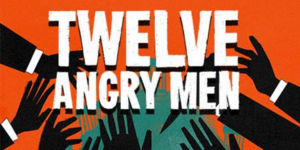Courtroom Drama TWELVE ANGRY MEN to Play Syracuse Stage

Courtroom drama at its best fills the stage as the American classic "Twelve Angry Men" continues the 2019/2020 Syracuse Stage season, Oct. 9 - 27.
Set in 1957 in the jury room of a New York City courthouse, Reginald Rose's absorbing drama unfolds on a sweltering afternoon as a jury of 12 men decide the fate of a teenager accused of murdering his father. For 11, the verdict is quick and easy-guilty. For one, there is enough doubt to warrant further questioning.
"We're talking about somebody's life here," he says. "I mean, we can't take five minutes. Suppose we're wrong?"
What ensues over a taut 90 minutes of well-honed dialogue and superb performance is a confrontation filled with shifting perspectives and alliances, revelations and admissions that expose the jurors' passions, prejudices and human failings. With the stakes as high as a young man's life, the jury room becomes a pressurized chamber of tension and volatility, as one by one the 11 jurors reconsider their hasty preliminary conclusion.
"Twelve Angry Men" is a classic example of well-constructed and carefully crafted drama from the mid-20th century. It first appeared as a live teleplay in 1954, and then in 1957 was made into the more widely known film version starring Henry Fonda as Juror Eight, the initial hold-out against the quick verdict. While clearly rooted in that time, the stage version finds resonance with the world today.
"Obviously the play deals in issues of racism and prejudice, which could not be more contemporary, sadly," says James Still who directs the production for Syracuse Stage. Still notes that in essence the play is a difficult conversation that the 12 jurors, who are never named and are strangers to each other, are forced to have. The way they negotiate their responsibilities as jurors, he explains, could be instructive in the current polarized political climate.
"The jurors are forced into a dialogue, and I hope whatever political allegiance people hold in 2019, they could agree with me that we could use more dialogue today," Still says. "For me the play is so much about point of view and shifting points of view. It addresses the nature of compromise. How do you compromise? How do you compromise and feel ethically good about it, feel that you've done the right thing?"
Very much at play, as well, is the reticence some jurors exhibit in the deliberations. Still points out that the jury room is a small space that starts to feel claustrophobic, and for most of the time, all of the actors are present on stage.
"The play is about what happens around that table. We get to see how people are responding when they don't speak up. That's the story. That's not secondary," he says.
In the end, however, Still finds optimism in the play because the experience of witnessing this very hard conversation can encourage a kind of self-reflection much needed today.
"Watching these 12 jurors work through biases, personal histories and snap judgments, and in some cases discomfort with the role they've been asked to play as decision makers, watching them work through all of that I think is potentially instructive," the director says. "It allows us to ask ourselves, what would I do in that situation? What should I be doing now in my own situation?"
The pairing of "Twelve Angry Men," with its jury of 12 white men, and Stage's first show, the world premiere of Keenan Scott II's "Thoughts of a Colored Man," was a deliberate dramaturgical choice by Artistic Director Robert Hupp.
"The male characters in 'Twelve Angry Men,' and the values they embody, live in contrast to the seven men in 'Thoughts of a Colored Man.' The adjacency is dramaturgically intentional," Hupp said. "'Twelve Angry Men' has been subjected to many updates and modernizations, but we thought the play spoke most clearly in its original structure: a room full of white men holding the life of a nameless young man, presumably a young man of color, in their hands. Taken together, 'Thoughts of a Colored Man' and 'Twelve Angry Men' force us to confront how much some things haven't changed. Couldn't any of the characters in 'Thoughts of a Colored Man' be the nameless man on trial in 'Twelve Angry Men?'"
As with "Thoughts of a Colored Man," Stage will partner with various community and Syracuse University organizations to present events related to the production of "Twelve Angry Men." Among these are a panel discussion on race in the American judicial system, "How the Unheard Defendant in Twelve Angry Men Speaks to Our Now," which is part of the Syracuse University Humanities Center Fall 2019 Syracuse Symposium titled "silence." The event follows the Oct. 13 matinee performance. Other community partnerships include the Central New York Women's Bar Association, William Herbert Johnson Bar Association of CNY, Onondaga County Bar Association, Hiscock Legal Aid Society and Generation Next.
Comments

Videos


